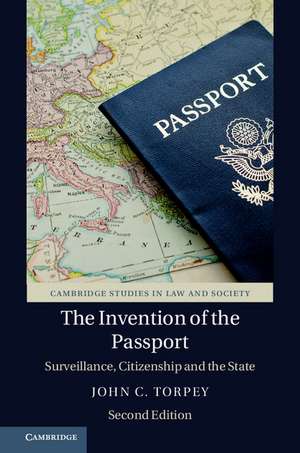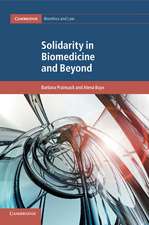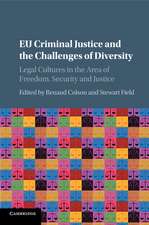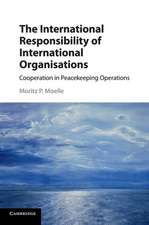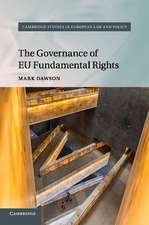The Invention of the Passport: Surveillance, Citizenship and the State: Cambridge Studies in Law and Society
Autor John C. Torpeyen Limba Engleză Paperback – 25 iul 2018
| Toate formatele și edițiile | Preț | Express |
|---|---|---|
| Paperback (1) | 163.31 lei 3-5 săpt. | |
| Cambridge University Press – 25 iul 2018 | 163.31 lei 3-5 săpt. | |
| Hardback (1) | 699.63 lei 6-8 săpt. | |
| Cambridge University Press – 25 iul 2018 | 699.63 lei 6-8 săpt. |
Din seria Cambridge Studies in Law and Society
- 9%
 Preț: 661.47 lei
Preț: 661.47 lei -
 Preț: 233.96 lei
Preț: 233.96 lei -
 Preț: 217.08 lei
Preț: 217.08 lei -
 Preț: 290.77 lei
Preț: 290.77 lei -
 Preț: 168.85 lei
Preț: 168.85 lei -
 Preț: 207.99 lei
Preț: 207.99 lei -
 Preț: 169.28 lei
Preț: 169.28 lei -
 Preț: 217.44 lei
Preț: 217.44 lei -
 Preț: 236.96 lei
Preț: 236.96 lei -
 Preț: 318.50 lei
Preț: 318.50 lei -
 Preț: 185.40 lei
Preț: 185.40 lei - 11%
 Preț: 559.13 lei
Preț: 559.13 lei - 9%
 Preț: 694.92 lei
Preț: 694.92 lei -
 Preț: 274.60 lei
Preț: 274.60 lei -
 Preț: 201.39 lei
Preț: 201.39 lei -
 Preț: 289.76 lei
Preț: 289.76 lei -
 Preț: 237.42 lei
Preț: 237.42 lei -
 Preț: 176.91 lei
Preț: 176.91 lei - 9%
 Preț: 695.23 lei
Preț: 695.23 lei -
 Preț: 289.76 lei
Preț: 289.76 lei -
 Preț: 279.65 lei
Preț: 279.65 lei -
 Preț: 295.08 lei
Preț: 295.08 lei - 14%
 Preț: 723.92 lei
Preț: 723.92 lei -
 Preț: 392.55 lei
Preț: 392.55 lei -
 Preț: 375.68 lei
Preț: 375.68 lei -
 Preț: 327.30 lei
Preț: 327.30 lei - 14%
 Preț: 725.57 lei
Preț: 725.57 lei -
 Preț: 375.68 lei
Preț: 375.68 lei -
 Preț: 379.07 lei
Preț: 379.07 lei - 11%
 Preț: 689.87 lei
Preț: 689.87 lei - 14%
 Preț: 839.50 lei
Preț: 839.50 lei -
 Preț: 429.12 lei
Preț: 429.12 lei - 11%
 Preț: 694.91 lei
Preț: 694.91 lei - 14%
 Preț: 729.73 lei
Preț: 729.73 lei -
 Preț: 373.56 lei
Preț: 373.56 lei -
 Preț: 422.47 lei
Preț: 422.47 lei - 14%
 Preț: 727.72 lei
Preț: 727.72 lei -
 Preț: 308.12 lei
Preț: 308.12 lei -
 Preț: 398.54 lei
Preț: 398.54 lei - 14%
 Preț: 727.07 lei
Preț: 727.07 lei - 14%
 Preț: 726.42 lei
Preț: 726.42 lei - 14%
 Preț: 781.19 lei
Preț: 781.19 lei - 11%
 Preț: 461.43 lei
Preț: 461.43 lei
Preț: 163.31 lei
Nou
Puncte Express: 245
Preț estimativ în valută:
31.25€ • 32.43$ • 26.12£
31.25€ • 32.43$ • 26.12£
Carte disponibilă
Livrare economică 22 februarie-08 martie
Preluare comenzi: 021 569.72.76
Specificații
ISBN-13: 9781108462945
ISBN-10: 1108462944
Pagini: 280
Dimensiuni: 151 x 228 x 14 mm
Greutate: 0.46 kg
Ediția:2Revizuită
Editura: Cambridge University Press
Colecția Cambridge University Press
Seria Cambridge Studies in Law and Society
Locul publicării:Cambridge, United Kingdom
ISBN-10: 1108462944
Pagini: 280
Dimensiuni: 151 x 228 x 14 mm
Greutate: 0.46 kg
Ediția:2Revizuită
Editura: Cambridge University Press
Colecția Cambridge University Press
Seria Cambridge Studies in Law and Society
Locul publicării:Cambridge, United Kingdom
Cuprins
Preface to the second edition; Introduction; 1. Coming and going: on the state monopolization of the legitimate 'means of movement'; 2. 'Argus of the Patrie': the passport question in the French Revolution; 3. Sweeping out Augeas's stable: the nineteenth-century trend toward freedom of movement; 4. Toward the 'crustacean type of nation': the proliferation of identification documents from the late nineteenth century to the First World War; 5. From national to postnational? Passports and constraints on movement from the interwar to the postwar era; 6. 'Everything changed that day': passport regulations after the terrorist attacks of September 11, 2001; Conclusion: a typology of 'papers'; References; Index.
Notă biografică
Descriere
The definitive history of the passport and why it became so important for controlling movement in the modern world.
